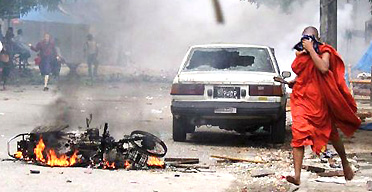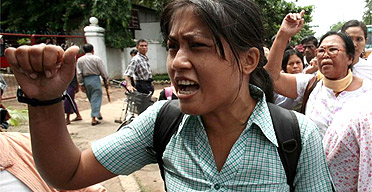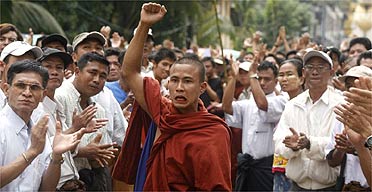Burmese security forces clashed with demonstrators massed on the streets of Rangoon today in violence that left at least one civilian, and possibly several others, dead.
The military government acknowledged the first confirmed fatality of the crackdown, stating that one civilian had been killed and three wounded. But other reports, citing witnesses in Rangoon, said at least three people had been shot dead, including two monks, while the government-in-exile put the toll at five dead.
The first casualties in a week of mass protests came as riot police backed by army troops fired warning shots and tear gas and wielded batons against crowds, in the biggest show of public anger against the junta in almost two decades.
As darkness fell, people dispersed ahead of a dusk-to-dawn curfew with the streets almost deserted.
Zin Linn, the information minister for the national coalition government of the union of Burma, Burma's self-styled government-in-exile, said at least five monks were killed, while an organisation of exiled political activists in Thailand, the National League for Democracy-Liberated Area said three monks had died, and about 17 wounded.
Some witnesses estimated 100,000 people took to the streets despite fears of a repeat of the ruthless suppression of Burma's last major uprising, in 1988, when soldiers killed an estimated 3,000 people.
"They are marching down the streets, with the monks in the middle and ordinary people either side. They are shielding them, forming a human chain," one witness told Reuters.
In the second city of Mandalay, also under curfew, the Asian Human Rights Commission said there was no opposition to 10,000 marchers.
About 300 monks and activists were arrested across Rangoon after defying government orders to stay home, according to an exile dissident group.
The junta has banned all public gatherings of more than five people and imposed a night-time curfew following eight days of anti-government marches led by monks across the country.
As the protests turned violent, the French foreign minister, Bernard Kouchner, told reporters the UN security council would meet later today to discuss the situation. France holds the rotating presidency of the security council.
Earlier, the prime minister, Gordon Brown, called for an emergency meeting of the council on the rapidly developing events. "I would like to see all the pressures of the world put upon this regime now," he said.
In neighbouring Thailand, the army was preparing C-130 planes to airlift its citizens from Rangoon if the violence escalated, and troops on the border were braced for a flood of refugees.
The clashes broke out as monks, nuns and students attempted to gather at Rangoon's Shwedagon pagoda, the country's holiest Buddhist shrine in defiance of a government ban on public assembly.
Police squads baton-charged the crowd of around 700 people, and witnesses said between 80 and 100 protesters, some bloodied and injured, were arrested and taken away in army vehicles with obscured identification numbers.
The neighbourhood has been one of the focal points for more than a week of demonstrations that have escalated into the biggest challenge to the military junta since 1988.
Many of the monks wore face masks to protect themselves from gas, and some carried flags showing a fighting peacock - a key symbol of the democracy movement.
The junta's moves to halt the protests came after it imposed a night curfew in Rangoon and Mandalay, banning gatherings of more than five people. Up to ten pro-democracy activists were arrested in police raids overnight. Zaganar, a comedian famed for his anti-government jibes, and U Win Naing, a veteran government opponent, were among the most high-profile.
Barbed wire roadblocks were erected in parts of Rangoon, and security forces threw a tight cordon around the home of the detained opposition leader, Aung San Suu Kyi. Security forces were also present at five other monasteries around the city.
Foreign governments and religious leaders have urged the junta to deal peacefully with the situation. They included the Dalai Lama and South African Archbishop Desmond Tutu, both Nobel peace prize laureates like Ms Suu Kyi.
China, Burma's main ally, has been making an effort to let the generals know how worried the international community is, a Beijing-based diplomat said.
Representatives of Burma's pro-democracy and ethnic groups told Reuters that Chinese officials had been meeting quietly with them behind the scenes for months, partly hedging their bets.
Mark Canning, Britain's ambassador to Burma, yesterday met Burmese leaders and urged continued restraint. Mr Canning said he told ministers that the demonstrations "have been peaceful and well-disciplined".
"It will be disastrous in the eyes of the world on Burma if the authorities use force," he added.
Human rights groups have called on the military government to release political activists and begin serious dialogue with the opposition.
"The obligation of the international community, particularly Burma's allies, is to press the military to do that, including through a special session of the [UN] human rights council," said Adams, the Asia director at Human Rights Watch, based in New York, said.
"Anything less is tantamount to support for prolonged military rule and an endorsement of the clearly bankrupt political and economic system the generals have constructed."








